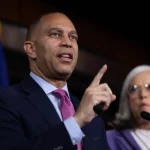
A popular joke I heard passed around more than once over the weekend in conservative circles: “Alissa Heinerscheid now identifies as unemployed.”
Heinerscheid, for the unfamiliar, is the marketing VP for Bud Light who became the face of the disastrous decision to make transgender TikTok influencer Dylan Mulvaney the face of the beer brand.
While it’s not clear who exactly came up with the brilliant idea to make the woke left turn in strategy, Heinerscheid was the one who had gone on a podcast in the weeks prior to the Mulvaney campaign and said, “Bud Light had been kind of a brand of fratty, kind of out-of-touch humor” and that she was dedicated to “shifting the tone” toward, among other things, “inclusivity” and “representation.”
The joke is a bit like Mulvaney: Just as his self-identification as female doesn’t make Mulvaney female, quipping that Heinerscheid “identifies” as unemployed doesn’t make her unemployed. On Friday, marketing outlet AdAge reported that Heinerscheid, who’s been marketing VP for the brand for less than a year, “has taken a leave of absence.”
Meet Alissa Heinerscheid, Bud Light’s VP of Marketing. She explains her strategy of using “inclusive” marketing to promote the brand to young people. pic.twitter.com/hFpe8YnbBc
— Catch Up (@CatchUpFeed) April 9, 2023
However, according to AdAge, Bud Light’s owner, Belgium-based multinational AB InBev, also said in a statement that it was reducing the layers of its marketing division “so that our most senior marketers are more closely connected to every aspect of our brand’s activities” and that “these steps will help us maintain focus on the things we do best: brewing great beer for all consumers, while always making a positive impact in our communities and on our country.”
By “our country,” I’m assuming they didn’t mean Belgium. The reason Heinerscheid became the face of the Mulvaney campaign was how out-of-touch she sounded when it came to Americans who didn’t attend Harvard, her alma mater. (Where, it must be said, she did some pretty “fratty” stuff.) Thus, it’s safe to say that the leave of absence might indeed become more permanent than any “transition” Mulvaney might make, considering how hard the brand is trying to make conservative consumers forget this ever happened.
One Anheuser-Busch executive, however, told Fox News this was the “wrong bet to make.”
Will you forgive Anheuser-Busch?
Yes: 17% (2 Votes)
No: 83% (10 Votes)
In an appearance on “Fox & Friends Weekend” on Sunday, Anson Frericks, who spent more than 10 years with the company, said the problem is that out-of-touch outsiders — including those not with the company — don’t understand what makes the brand tick.
Now, AB InBev is scrambling to overcompensate, including, according to Fox, hiring two Beltway consultants “with experience in Washington, D.C.’s conservative cirles.”
“That’s the bet they’re making. I think that’s the wrong bet to make,” Frericks said during the interview.
“And I think now is the time to go back and, for companies like Anheuser-Busch, to say that, ‘Hey, moving forward for brands like Bud Light, we’re not going to be political. We’re not going to get involved in the environmental social governance movement because that’s not what the customer wants.’”
However, because of the leftist focus on cultural issues, known as ESG, Frericks said an “apolitical brand” has been dragged into the culture wars by “all these so-called stakeholders, political organizations, activist organizations.”
“There’s a more fundamental problem that’s going on right now where Anheuser-Busch has to choose who it’s going to be accountable to,” he said.
“Will it be its shareholders? Or its so-called ‘stakeholders’?
“Let me explain. Historically, Anheuser-Busch has been accountable to its shareholders, which are people like firefighters, doctors, lawyers that invested in companies like Anheuser-Busch via 401(k)s or their pension plans,” he said.
“Over the last couple of years, there’s been organizations like BlackRock, State Street and Vanguard that have pushed this new model of stakeholder capitalism, asking companies like Anheuser-Busch to be accountable to all these so-called stakeholders, political organizations, activist organizations.
“And they do that by implementing ESG, or environmental social governance policies, in corporations that ask them to get involved in these controversial issues.
“But unfortunately, when you try to be everything to everyone, you end up being accountable to no one.”
The interview is below:
Watch the latest video at foxnews.com
The day before Heinerscheid’s leave-of-absence was announced, Frericks had a commentary piece published in The Wall Street Journal in which he wrote that his former company “has fallen in line with other companies engaged in ‘stakeholder capitalism,’ which prioritizes broad social issues over shareholder value.”
“It wasn’t always this way. I worked at Anheuser-Busch for 11 years, rising to U.S. president of sales and distribution before leaving in 2022. The firm was focused on increasing shareholder value and did so in part by offering a high-quality and, at the time, decidedly apolitical product: Bud Light,” he wrote.
However, thanks to investment firms getting behind the trend, “Anheuser-Busch fell in line with the ESG fad, despite evidence showing it harms shareholder value,” Frericks wrote.
“In 2020 it launched a Global Diversity and Inclusion Council. In 2021 it trained about 9,800 workers in ‘bias breaking’ and over 2,000 in ‘psychological safety.’ It subjected all senior executive to individualized ‘D&I’ — diversity and inclusion — dashboards, tracking the demographic composition of their teams.”
And now, to try to wallpaper over the Mulvaney controversy, here are the moves Anheuser-Busch made: A non-apology apology letter and a naked attempt at creating a patriotic ad so filled with “Murica” vibes it came across as self-parody:
— Anheuser-Busch (@AnheuserBusch) April 14, 2023
— Budweiser (@budweiserusa) April 14, 2023
Frericks argues the issue is larger than this, however, and won’t just be solved by the company repositioning some of its products as “conservative” or “patriotic.”
In his Wall Street Journal piece, he noted the strategy has “worked for successful companies like Netflix, which in 2021 refused to censor Dave Chappelle’s comedy special after certain employees claimed it was offensive.”
“Anheuser-Busch can do the same by ditching stakeholder capitalism. It can return to a strategy with proven success: focusing on the celebratory moments that bring people together and steering clear of divisive politics. Shareholders and customers can all say cheers to that,” he wrote.
Unfortunately, AB InBev isn’t likely to be identifying as apolitical anytime soon. After making a mockery of its customers by making a man who “identifies” as a woman the face of its campaign, it’s temporarily identifying as blue-collar stars-and-stripes Middle America until you forget about this. As part of this campaign, Heinerscheid’s identification as an employee of the company will quietly come to a close, I predict.
The only joke left, however, will be the AB InBev execs who think this will fix the problem.







